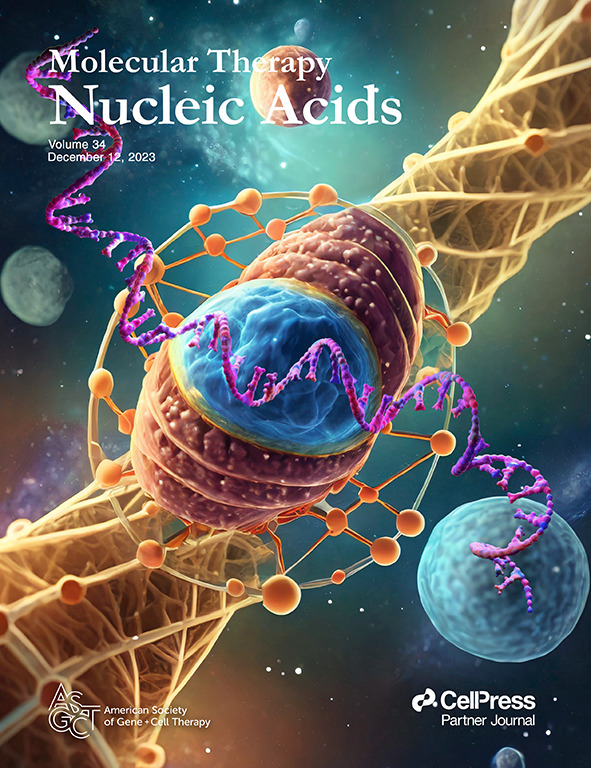Protection of animals against devastating RNA viruses using CRISPR-Cas13s
IF 6.5
2区 医学
Q1 MEDICINE, RESEARCH & EXPERIMENTAL
引用次数: 0
Abstract
The intrinsic nature of CRISPR-Cas in conferring immunity to bacteria and archaea has been repurposed to combat pathogenic agents in mammalian and plant cells. In this regard, CRISPR-Cas13 systems have proved their remarkable potential for single-strand RNA viruses targeting. Here, different types of Cas13 orthologs were applied to knockdown foot-and-mouth disease virus (FMDV), a highly contagious disease of a wide variety of species with genetically diverse strains and is widely geographically distributed. Using programmable CRISPR RNAs capable of targeting conserved regions of the viral genome, all Cas13s from CRISPR system type VI (subtype A/B/D) could comprehensively target and repress different serotypes of FMDV virus. This approach has the potential to destroy all strains of a virus as targets the ultra-conserved regions of genome. We experimentally compared the silencing efficiency of CRISPR and RNAi by designing the most effective short hairpin RNAs according to our developed scoring system and observed comparable results. This study showed successful usage of various Cas13 enzymes for suppression of FMDV, which provides a flexible strategy to battle with other animal infectious RNA viruses, an underdeveloped field in the biotechnology scope.利用 CRISPR-Cas13s 保护动物免受毁灭性 RNA 病毒的侵害
CRISPR-Cas在赋予细菌和古细菌免疫力方面的固有特性已被重新用于对抗哺乳动物和植物细胞中的病原体。在这方面,CRISPR-Cas13 系统已经证明了其在靶向单链 RNA 病毒方面的巨大潜力。口蹄疫病毒(FMDV)是一种传染性极强的疾病,可感染多种物种,其毒株基因多样,地理分布广泛。利用能够靶向病毒基因组保守区域的可编程CRISPR RNA,CRISPR系统VI型(A/B/D亚型)的所有Cas13s都能全面靶向并抑制FMDV病毒的不同血清型。这种方法以基因组的超保守区为目标,有可能消灭病毒的所有毒株。我们通过实验比较了 CRISPR 和 RNAi 的沉默效率,根据我们开发的评分系统设计了最有效的短发夹 RNA,并观察到了相似的结果。这项研究表明,利用各种 Cas13 酶抑制口蹄疫病毒取得了成功,这为与其他动物传染性 RNA 病毒的斗争提供了灵活的策略,而这正是生物技术领域尚未开发的领域。
本文章由计算机程序翻译,如有差异,请以英文原文为准。
求助全文
约1分钟内获得全文
求助全文
来源期刊

Molecular Therapy. Nucleic Acids
MEDICINE, RESEARCH & EXPERIMENTAL-
CiteScore
15.40
自引率
1.10%
发文量
336
审稿时长
20 weeks
期刊介绍:
Molecular Therapy Nucleic Acids is an international, open-access journal that publishes high-quality research in nucleic-acid-based therapeutics to treat and correct genetic and acquired diseases. It is the official journal of the American Society of Gene & Cell Therapy and is built upon the success of Molecular Therapy. The journal focuses on gene- and oligonucleotide-based therapies and publishes peer-reviewed research, reviews, and commentaries. Its impact factor for 2022 is 8.8. The subject areas covered include the development of therapeutics based on nucleic acids and their derivatives, vector development for RNA-based therapeutics delivery, utilization of gene-modifying agents like Zn finger nucleases and triplex-forming oligonucleotides, pre-clinical target validation, safety and efficacy studies, and clinical trials.
 求助内容:
求助内容: 应助结果提醒方式:
应助结果提醒方式:


